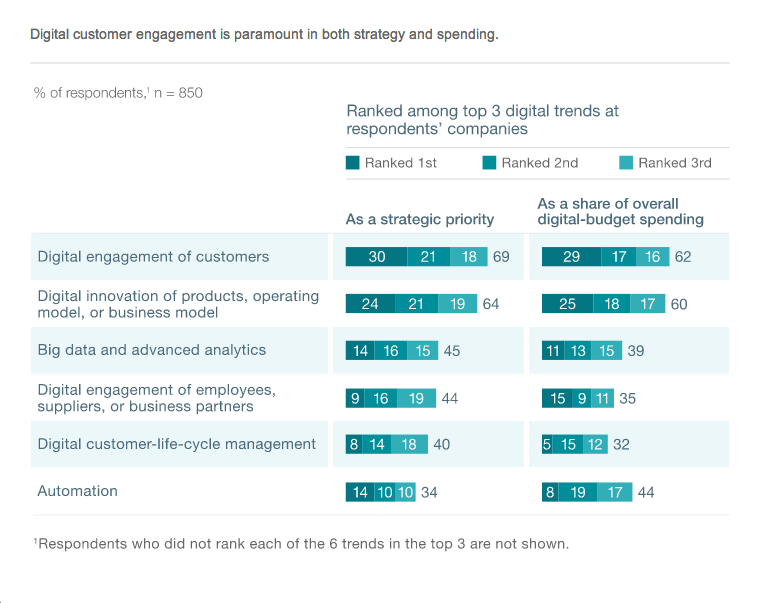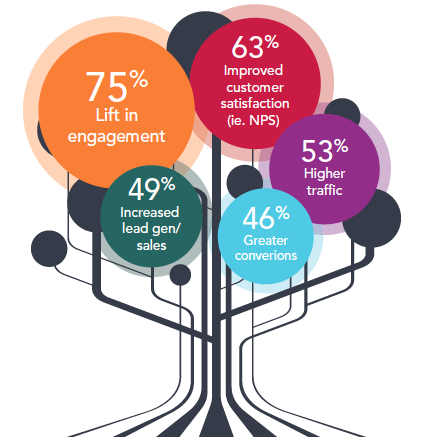
Digital transformation is a journey that many companies undertake today in order to improve their performance and achieve business results. Results from the June 2014 McKinsey Global Survey1 revealed that “executives expect the largest share of their digital growth in the coming years will be from digital customer engagement, followed closely by the digital innovation of products, operating models, or business models.”

The Altimeter Group examined the digitalization trend in more detail and summarized its findings in its study The 2014 State of Digital Transformation2. The report examined digital transformation from a customer-centric prospective, defining the term as “the realignment of, or new investment in, technology and business models,” with the ultimate goal to “more effectively engage digital customers at every touch point in the customer experience lifecycle.”
 Digital transformation is important and according to study respondents, the top five benefits that companies anticipate as a result of formal digital transformation efforts are:
Digital transformation is important and according to study respondents, the top five benefits that companies anticipate as a result of formal digital transformation efforts are:
- Engagement lift
- Improved customer satisfaction
- Higher traffic
- Greater conversions
- Increased lead gen/sales
But how do companies successfully undergo the transformation to reap these benefits? Altimeter interviewed business executives and leaders who drive digital transformation in their companies and shared three takeaways.
Digital transformation is more than an investment in digital and technology
The way that customers and companies behave in the digital space has defined the nature of investment into strategy and technology. The changes associated with the application of digital technology – in all aspects of human society – are also a part of this transformation, and it’s incredibly important for companies to track this behavioral evolution. But few have yet to follow suit.
Andy Hedges, Director Shopping Centre Management at Westfield, observed the “digital-first” approach as a do-or-die moment: “Retailers are not embracing the consumer changes. They know they have to do it, but don’t know how or where to start.”
Digital transformation comes down to people
Digital transformation is a significant movement that embraces different dimensions of the company and requires change across a variety of spheres, beginning with corporate culture. Sixty-three percent (63%) of study respondents stated that digital transformation is an extremely significant challenge for a company – since a company’s culture is almost always derived from the company’s leadership style. Leaders and employees can drive digital transformation and create awareness for change. So can the C-Suite, although roughly 42% of respondents said C-Suite support for digital transformation is challenging to earn.
Other notable challenges to change are:
- Cross-functional collaboration within the company
- Obtaining enough customer data
- Resource procurement and allocation
Obtaining enough customer data was also listed as a notable challenge to digital transformation. Even thought the customer journey has become a popular trend in digital marketing, Altimeter found only 25% of digital leaders invest in mapping their customers’ journeys.
Discover’s Head of Digital, Mike Boush, explained the influence of this practice on his company’s strategic changes: “The customer journey online is the heart, and we need to understand how that flows and is mapped out. But after we went through that journey, we wanted to change some of our products.”
No matter how digital transformation is pursued, businesses are changing.
“The potential of digital is its ability to bridge functions, soften silos, and make informal connections that you typically don’t have through reporting lines,” said Nestlé’s Global Head of Digital and Social Pete Blackshaw.
Digital transformation can make the distribution of information within the company faster and more transparent, bring about new processes and business models, boost collaboration and productivity and break down the barriers within the company that inhibit growth and forward momentum.
However, most companies expect the CMO to lead digital transformation; so marketers, are you ready3?
Resources
- The Digital Tipping Point: McKinsey Global Survey Results: http://www.mckinsey.com/insights/business_technology/The_digital_tipping_point_McKinsey_Global_Survey_results?cid=DigitalEdge-eml-alt-mip-mck-oth-1406
- The 2014 State of Digital Transformation – How Companies Are Investing in the Digital Customer Experience (DCX): http://www.altimetergroup.com/2014/07/the-2014-state-of-digital-transformation/
- Most Companies Expect CMO to Lead Digital Transformation: http://adage.com/article/cmo-strategy/companies-expect-cmo-lead-digital-transformation/294241/